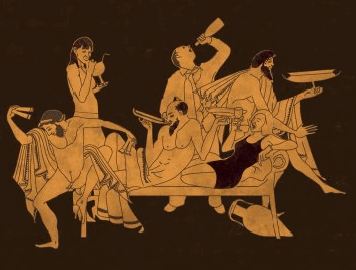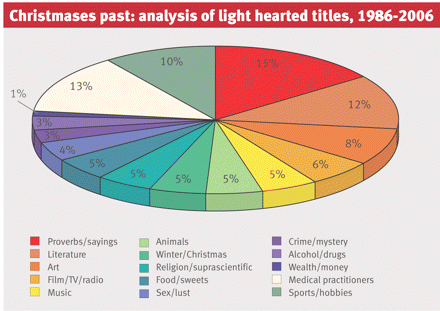December 21, 2007
'Tis the season
 It's an old tradition for the British Medical Journal to publish spoof articles in its Christmas issue. This week's BMJ continues the tradition, as the cover image reprinted on the right suggests. For example, one of the featured articles is Sreeram V Ramagopalan et al., "Origins of magic: review of genetic and epigenetic effects", BMJ 335:1299-1301, 22 December 2007:
It's an old tradition for the British Medical Journal to publish spoof articles in its Christmas issue. This week's BMJ continues the tradition, as the cover image reprinted on the right suggests. For example, one of the featured articles is Sreeram V Ramagopalan et al., "Origins of magic: review of genetic and epigenetic effects", BMJ 335:1299-1301, 22 December 2007:
Objective To assess the evidence for a genetic basis to magic.
Design Literature review.
Setting Harry Potter novels of J K Rowling.
Participants Muggles, witches, wizards, and squibs.
Interventions Limited.
Main outcome measures Family and twin studies, magical ability, and specific magical skills.
Results Magic shows strong evidence of heritability, with familial aggregation and concordance in twins. Evidence suggests magical ability to be a quantitative trait. Specific magical skills, notably being able to speak to snakes, predict the future, and change hair colour, all seem heritable.
Conclusions A multilocus model with a dominant gene for magic might exist, controlled epistatically by one or more loci, possibly recessive in nature. Magical enhancers regulating gene expression may be involved, combined with mutations at specific genes implicated in speech and hair colour such as FOXP2 and MCR1.
I can also recommend the article by Gareth Williams and Poonam Dharmaraj, "Dissent of the testis", which complains that the redesign of certain popular British candies means that they are no longer a suitable substitute for 8 ml orchidometer beads "to gauge testicular volume" ("This is a major setback for paediatric endocrinology, and the manufacturer's decision to change the sweets' morphology without consulting the medical profession is a further kick in the Teasers.")
The practice of running spoof stories in the BMJ Christmas issue is not exactly a secret. The lead article in this year's issue includes a pie chart showing the topical distribution of spoofs over the past two decades:

Apparently, it's an equally old tradition for the reporters and editors at BBC News to swallow such jokes hook, line and sinker. A letter printed in the BMJ in 2003, from John Attia and Kichu Nair, notes:
Every year the BMJ and Medical Journal of Australia use their Christmas edition to inject some medical humour into the normally serious scientific literature.
In this spirit we put together a fictional study entitled "Evidence based physicians' dressing: a cross-over trial," in which we documented the effect of "retro" dress (flared jeans, Hawaiian shirts, moussed hair, and nose rings) on patients' confidence.
Tongue in cheek, we described the Kolmogorov-Smirnoff test as two statisticians eyeballing the data over a glass of vodka, and we created a "fashion-operator characteristic" curve which defined a zone of "fashion limbo." We also calculated a number needed to dress (NND), analogous to the number needed to treat (NNT).
Despite what we and others saw as the obvious lightheartedness of this story, it has been reported as a serious research finding by the BBC ...
This year, the BBC news team somehow missed the stories on the genetics of magic and the testicular shape of Teasers, but did cover at least two spoof stories as if they were serious. One was Lee Graves et al., "Comparison of energy expenditure in adolescents when playing new generation and sedentary computer games: cross sectional study":
Procedure Participants were fitted with a monitoring device validated to predict energy expenditure. They played four computer games for 15 minutes each. One of the games was sedentary (XBOX 360) and the other three were active (Wii Sports).
Main outcome measure Predicted energy expenditure, compared using repeated measures analysis of variance.
Results Mean (standard deviation) predicted energy expenditure when playing Wii Sports bowling (190.6 (22.2) kJ/kg/min), tennis (202.5 (31.5) kJ/kg/min), and boxing (198.1 (33.9) kJ/kg/min) was significantly greater than when playing sedentary games (125.5 (13.7) kJ/kg/min) (P<0.001). Predicted energy expenditure was at least 65.1 (95% confidence interval 47.3 to 82.9) kJ/kg/min greater when playing active rather than sedentary games.
Conclusions Playing new generation active computer games uses significantly more energy than playing sedentary computer games but not as much energy as playing the sport itself.
This was picked up as "Wii players need to exercise too" ("Playing 'active' computer games on consoles such as the Nintendo Wii is no substitute for playing real sports, warn UK experts.") Curiously, the BBC reporter was unable to transcribe the spoof article's statistics correctly -- the third sentence of the article reads:
Wii players used only 2% more energy than players of regular computer games.
which is a strange way to report the statement "Predicted energy expenditure was at least 65.1 (95% confidence interval 47.3 to 82.9) kJ/kg/min greater when playing active rather than sedentary games."
The second spoof article picked up by the BBC news hounds was from the "Retirement" section -- Sam Shuster, "Sex, aggression, and humour: responses to unicycling", BMJ 335:1420-1322, 22 December 2007. The abstract:
After retiring from a busy university department in Newcastle upon Tyne, and with the time and the need for more than the usual consultancies, I was able follow some of my more extreme inclinations. As a cyclist, I had occasionally thought of using more or fewer wheels, but it was only when choosing a grandson’s gift that I got seriously lost in contemplation of a gleaming chrome unicycle. My wife said "buy the bloody" thing, which I did on the whim of the moment. After months of practice at home, I graduated to back streets, a small paved park, and finally town roads. I couldn’t avoid being noticed; in turn, I couldn’t avoid observing the form that notice took. Because at the time there were no other unicyclists in the area, such sightings would have been exceptional, yet I soon found that the responses to them were stereotyped and predictable. I realised that this indicated an underlying biological phenomenon and set about its study.
This was rendered as "Humour 'comes from testosterone'", 12/21/2007:
Men are naturally more comedic than women because of the male hormone testosterone, an expert claims.
Men make more gags than women and their jokes tend to be more aggressive, Professor Sam Shuster, of Norfolk and Norwich University Hospital, says. [...]
Professor Shuster believes humour develops from aggression caused by male hormones.
In these last two studies, it's possible (though not certain) that the reported data were not made up as a joke, even though the presentations are certainly light-hearted. And in fact, in the Australian case cited earlier, the news department of the BMJ itself was apparently fooled. The letter that I quoted before continues:
[Despite what we and others saw as the obvious lightheartedness of this story, it has been reported as a serious research finding by the BBC] and now the BMJ, both with a commentary from a medical expert.
We are both amused and alarmed by these occurrences and have been puzzling about their interpretation. Is this a sad commentary on:
* The sense of humour (or lack of it) in the medical scientific community?
* How thoroughly news media check their sources?
* The state of evidence based medicine? Does writing up something as a randomised trial give it such credence that it overrides common sense?
* How people read articles? Is an abstract sufficient to create the perception of veracity?We wish to set the record straight that this was a fictional study and was simply intended to be, and was labelled as, medical humour. From the amount of interest it has generated it may be a fertile area for real research.
I believe that the news department at the BMJ is has now gotten the hint to consider the date and the content before accepting silly-seeming stuff.
However, the journalists and editors at the BBC seem to be quite resistant to the idea of applying any such faculty of judgment -- though I've occasionally speculated that the whole BBC News enterprise is a sort of vast Pythonic joke, a secret subtle Onion, organized entirely for the private amusement of those initiated into its mysteries.
[Hat tip: Cosma Shalizi]
[Update -- Holly at Feministing doesn't think that the BBC's journalistic incompetence is funny at all ("The BBC says: humour 'comes from testosterone.' Holly says: bad reporting 'comes from the BBC.'", 12/21/2007). She's right, of course. But the BBC is insulated from market forces, and apparently impervious to complaint, so what can reasonable people do but try ridicule?]
[Update by Geoff Pullum: Sadly, it's not just the BBC, and it's not about insulation from market forces (the World Service of the BBC was spun off into a profit-making separate entity, and a lot of the bad science reporting seems to come from there). The Independent is a profit-making (or at least, profit-attempting) newspaper, and a comparatively good one; but on page 19 of the issue for today, Saturday December 22nd, 2007, you will find an earnest report by Jeremy Laurance, the Health Editor, reporting the story about the dermatologist on a unicycle correlating male jeering with testosterone level. He swallows it hook, line and sinker. It looks to me as if people are being put into science and medicine reporting when they do not have good science degrees. Or a sense of humor.]
[Update #3 -- the "humor from testosterone" story is certainly spreading vigorously around the world, presented as a serious scientific result. And the BBC is certainly not the only credulous (or opportunistic) media outlet: "Scientist claims men are funnier than women", The Telegraph; "Aggression 'makes men more humorous than women'", The Independent; "Humor Develops From Aggression Caused By Male Hormones, Professor Says", ScienceDaily; "Is humor tied to male aggression?", World Science; "Quand les testicule régissent l'humour", TF1; "Das Geheimnis des männlichen Witzes", Spiegel; "Humor entsteht aus Aggression", Die Welt; "L'umorismo è maschile perchè legato a testosterone", AGI; "'L'umorismo è maschio', sostiene una ricerca", ANSA; "El humor 'está en la testosterona'", BBC Mundo; "Bewijs: mannen hebben inderdaad meer humor", Elsevier; "Testosteron ger män aggressiv humor", Svenska Dagbladet; "Estudo diz que senso de humor está ligado à testosterona", BBC Brasil; "Smysl pro humor je prý výhradně mužská záležitost", České noviny. ]
[Update -- more here.]
Posted by Mark Liberman at December 21, 2007 11:04 PM